Cset english subtest 1 - Study guides, Class notes & Summaries
Looking for the best study guides, study notes and summaries about Cset english subtest 1? On this page you'll find 91 study documents about Cset english subtest 1.
Page 4 out of 91 results
Sort by
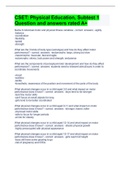
-
BUNDLE OF CSET QUESTION AND ANSWERS WELL SOLVED 2023
- Package deal • 51 items • 2023
-
- $40.39
- + learn more
Exam (elaborations) CSET: Physical Education, Subtest 1 Question and answers rated A 2 Exam (elaborations) CSET English Subtest I and II Question with complete solution 2023 3 Exam (elaborations) CSET Multiple Subjects Subtest 1 Reading Language and Literature Question and answers rated A 4 Exam (elaborations) CSET subtest 1 (world history) Q
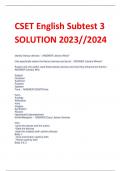
-
CSET English Subtest 3 SOLUTION 2023//2024
- Exam (elaborations) • 2 pages • 2024
- Available in package deal
-
- $9.49
- + learn more
CSET English Subtest 3 SOLUTION 2023//2024 Identify literary devices - ANSWER Literary What? Cite specifically where the literary devices are fpund - ANSWER Literary Where? Explain why the author used these literary devices and how they enhance the theme! - ANSWER Literary Why Subject Occasion Audience Purpose Speaker Tone - ANSWER SOAPSTone Form Analogy Alliteration Irony Imagery Symbolism Allusion Hyperbole/Understatement Simile/Metaphor - ANSWER Easy Literary Devices Int...
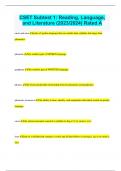
-
CSET Subtest 1: Reading, Language, and Literature (2023/2024) Rated A
- Exam (elaborations) • 10 pages • 2023
- Available in package deal
-
- $9.99
- + learn more
CSET Subtest 1: Reading, Language, and Literature (2023/2024) Rated A onset and rime parts of spoken language that are smaller than syllables but larger than phonemics phoneme the smallest part of SPOKEN language grapheme the smallest part of WRITTEN language phonics the fairly predictable relationship between phonemes and graphemes phonemic awareness the ability to hear, identify, and manipulate individual sounds in spoken langauge onset the initial consonant sound of a syllable (in bag is...
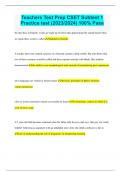
-
Teachers Test Prep CSET Subtest 1 Practice test (2023/2024) 100% Pass
- Exam (elaborations) • 6 pages • 2023
- Available in package deal
-
- $9.99
- + learn more
Teachers Test Prep CSET Subtest 1 Practice test (2023/2024) 100% Pass the idea that, in English, words are made up of letters that approximate the sounds heard when we speak these words is called alphabetic principle A teacher shows her student a picture of a fictional creature called a blurk. She asks them what two of these creatures would be called and they respond correctly with blurks. Her students demonstrated the ability to use morphological rules instead of remembering past experiences ...
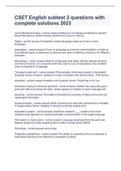
-
Package deal for CSET exam 2023 updated/verified
- Package deal • 22 items • 2023
-
- $40.49
- + learn more
1 Exam (elaborations) CSET Subtest 2 questions with complete solutions 2023 2 Exam (elaborations) CSET English subtest 2 questions with complete solutions 2023 3 Exam (elaborations) CSET General Science Overview questions and answered 2023 4 Exam (elaborations) CSET Math Subtest 1 questions with complete solutions 2023 5 Exam (elaborations) CSE
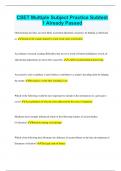
-
CSET Multiple Subject Practice Subtest 1 Already Passed
- Exam (elaborations) • 7 pages • 2023
- Available in package deal
-
- $9.99
- + learn more
CSET Multiple Subject Practice Subtest 1 Already Passed Oral rhyming activities are most likely to promote phonemic awareness by helping a child learn to: Attend to the sounds shared by words in the same word family According to research, reading difficulties that are not a result of limited intelligence or lack of educational opportunity are most often caused by: A deficit in phonological processing An extensive oral vocabulary is most likely to contribute to a reader's decoding skills by h...
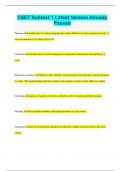
-
CSET Subtest 1 Latest Version Already Passed
- Exam (elaborations) • 13 pages • 2023
- Available in package deal
-
- $9.99
- + learn more
CSET Subtest 1 Latest Version Already Passed Phoneme smallest part of spoken language that makes difference in the meaning of words. if has two phoneme /i/ /f/ chech /ch/ /e/ /k/ Grapheme smallest part of written language that represent a phoneme in the spelling of a word Phonemic awareness ability to hear, identify, and manipulate the individual sounds phoneme in words. The understanding that that sounds work together to make words. Helps in reading Decoding analysis of spoken or written sym...
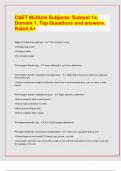
-
CSET Multiple Subjects: Subtest 1a, Domain 1, Top Questions and answers. Rated A+
- Exam (elaborations) • 19 pages • 2023
- Available in package deal
-
- $10.49
- + learn more
CSET Multiple Subjects: Subtest 1a, Domain 1, Top Questions and answers. Rated A+ Stages of Reading Development - --The emergent reader -The beginning reader -The fluent reader -The remedial reader The Emergent Reader: Age - -Early childhood to pre-K (pre-alphabetic) The Emergent Reader: Developmental Expectation - --Beginning of awareness that text progresses from left to right -Children scribble and recognize distinctive visual clues in environmental print, such as letters in their ...
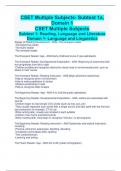
-
CSET Multiple Subjects- Subtest 1a, Domain 1 CSET Multiple Subjects Subtest 1- Reading, Language and Literature Domain 1- Language and Linguistics
- Exam (elaborations) • 15 pages • 2023
-
- $12.99
- + learn more
CSET Multiple Subjects- Subtest 1a, Domain 1 CSET Multiple Subjects Subtest 1- Reading, Language and Literature Domain 1- Language and Linguistics Stages of Reading Development - ANS--The emergent reader -The beginning reader -The fluent reader -The remedial reader The Emergent Reader: Age - ANS-Early childhood to pre-K (pre-alphabetic) The Emergent Reader: Developmental Expectation - ANS--Beginning of awareness that text progresses from left to right -Children scribble and recogni...
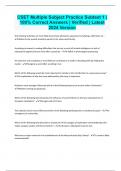
-
CSET Multiple Subject Practice Subtest 1 | 100% Correct Answers | Verified | Latest 2024 Version
- Exam (elaborations) • 4 pages • 2024
-
- $9.37
- + learn more
CSET Multiple Subject Practice Subtest 1 | 100% Correct Answers | Verified | Latest 2024 Version Oral rhyming activities are most likely to promote phonemic awareness by helping a child learn to: - Attend to the sounds shared by words in the same word family According to research, reading difficulties that are not a result of limited intelligence or lack of educational opportunity are most often caused by: - A deficit in phonological processing An extensive oral vocabulary is most...

How much did you already spend on Stuvia? Imagine there are plenty more of you out there paying for study notes, but this time YOU are the seller. Ka-ching! Discover all about earning on Stuvia


